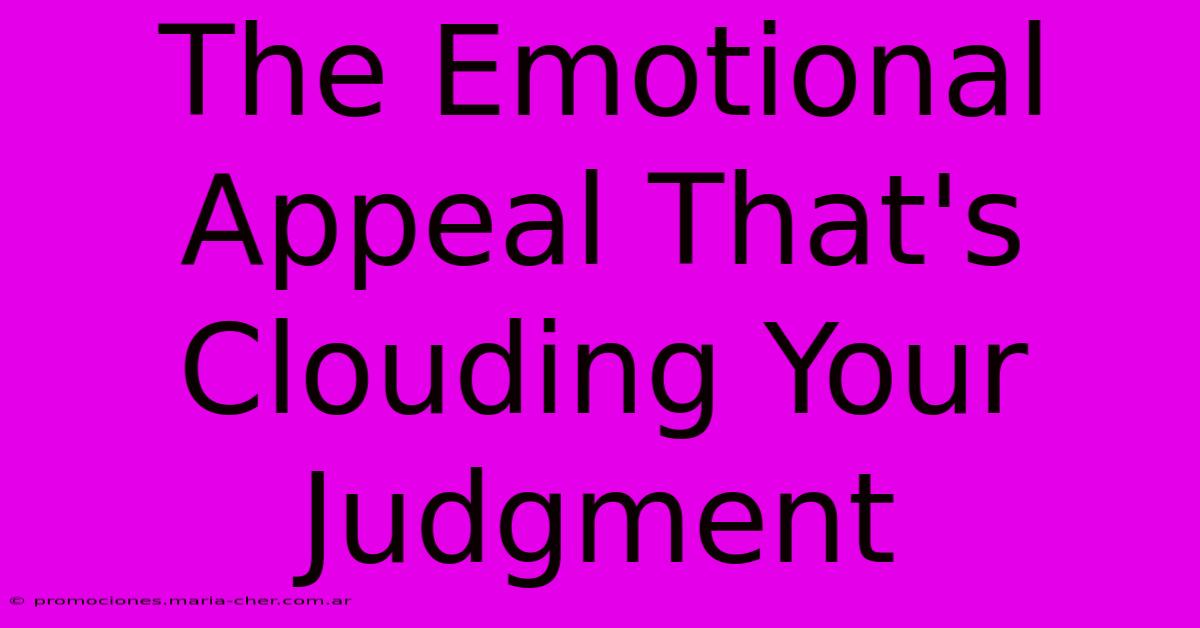The Emotional Appeal That's Clouding Your Judgment

Table of Contents
The Emotional Appeal That's Clouding Your Judgment
We make thousands of decisions daily, from mundane choices like what to eat for breakfast to significant ones like choosing a career path. While logic and reason play a crucial role, our emotions often act as silent yet powerful influencers, sometimes clouding our judgment and leading us down unexpected paths. Understanding this emotional appeal and its impact is key to making more rational and informed decisions.
Understanding the Power of Emotions
Our emotions are deeply ingrained responses to internal and external stimuli. They're not inherently good or bad; they're simply powerful motivators shaping our perceptions and behaviors. However, when emotions run high, they can override our cognitive abilities, leading to impulsive decisions and flawed judgments. This is especially true when dealing with emotionally charged topics like relationships, finances, or health.
The Amygdala's Influence: The Emotional Hijack
The amygdala, a small almond-shaped structure deep within the brain, is the primary center for processing emotions, particularly fear and anger. When faced with a stressful or emotionally charged situation, the amygdala can essentially "hijack" our rational thought processes. This emotional hijacking can manifest as:
- Impulsive Reactions: Acting before thinking, driven by immediate emotional responses.
- Tunnel Vision: Focusing solely on the emotional aspect, ignoring crucial facts and alternative perspectives.
- Cognitive Biases: Falling prey to biases like confirmation bias (seeking information that confirms pre-existing beliefs) or anchoring bias (over-relying on the first piece of information received).
Recognizing Emotional Appeals in Everyday Life
Emotional appeals are frequently used in marketing, advertising, and even politics to sway opinions and influence decisions. Identifying these appeals is crucial to preventing manipulation and making more objective choices. Examples include:
- Fear-mongering: Exaggerating threats to incite fear and encourage a specific action. Think of advertisements emphasizing the dangers of not buying a particular product.
- Appeal to sympathy: Evoking empathy or compassion to gain support or agreement, sometimes obscuring the factual basis of a situation. Charity campaigns often utilize this approach.
- Nationalism and Patriotism: Using national pride to manipulate decisions, often disregarding logic or critical analysis.
- Bandwagon effect: Creating the impression that everyone else is doing something, encouraging conformity and discouraging independent thought.
Spotting the Red Flags: Signs Your Emotions are Clouding Your Judgment
- Intense Physical Reactions: Rapid heartbeat, shortness of breath, or muscle tension can signal that emotions are overriding rational thought.
- Difficulty Focusing: Struggling to concentrate or consider alternative viewpoints is a clear indicator of emotional interference.
- Making Decisions Quickly: Impulsive decisions made without careful consideration often point to a lack of rational assessment.
- Ignoring Contradictory Evidence: Dismissing information that challenges existing beliefs or emotional convictions is a strong sign of bias.
Reclaiming Rationality: Strategies for Better Decision-Making
While eliminating emotions entirely isn't possible or desirable, we can learn to manage their influence on our decision-making process. Strategies to achieve this include:
- Mindfulness and Meditation: Practicing mindfulness helps to increase self-awareness and emotional regulation.
- Cognitive Behavioral Therapy (CBT): CBT techniques can help identify and challenge negative thought patterns and emotional biases.
- Seeking External Perspectives: Discussing important decisions with trusted friends, family, or professionals provides valuable external viewpoints and helps challenge emotional biases.
- Delaying Decisions: Giving yourself time to cool down and assess the situation rationally before making a final decision is incredibly important.
- Fact-Checking and Critical Thinking: Actively verifying information and critically analyzing arguments can help combat misinformation and emotional manipulation.
By understanding the power of emotional appeals and developing strategies to manage their influence, you can make more rational, informed decisions that align with your long-term goals and well-being. Learning to distinguish between genuine needs and emotional impulses is a crucial step toward greater self-awareness and improved decision-making. The path to better judgment begins with recognizing the subtle ways emotions can cloud our thinking.

Thank you for visiting our website wich cover about The Emotional Appeal That's Clouding Your Judgment. We hope the information provided has been useful to you. Feel free to contact us if you have any questions or need further assistance. See you next time and dont miss to bookmark.
Featured Posts
-
Mlgo Stock Reverse Splitted Is It Time To Invest
Feb 08, 2025
-
Workspace Freedom Experience The Versatility Of Hourly Office Rental In Nyc
Feb 08, 2025
-
Create Floral Masterpieces Without Breaking The Bank Unmissable Discounts On Dried Flowers
Feb 08, 2025
-
Uncover The Celtic Symbol For Courage The Salmon Of Wisdom Will Grant You Fearless Resolve
Feb 08, 2025
-
Doctors Hate This Revolutionary New Trick To Erase Wrinkles Overnight
Feb 08, 2025
